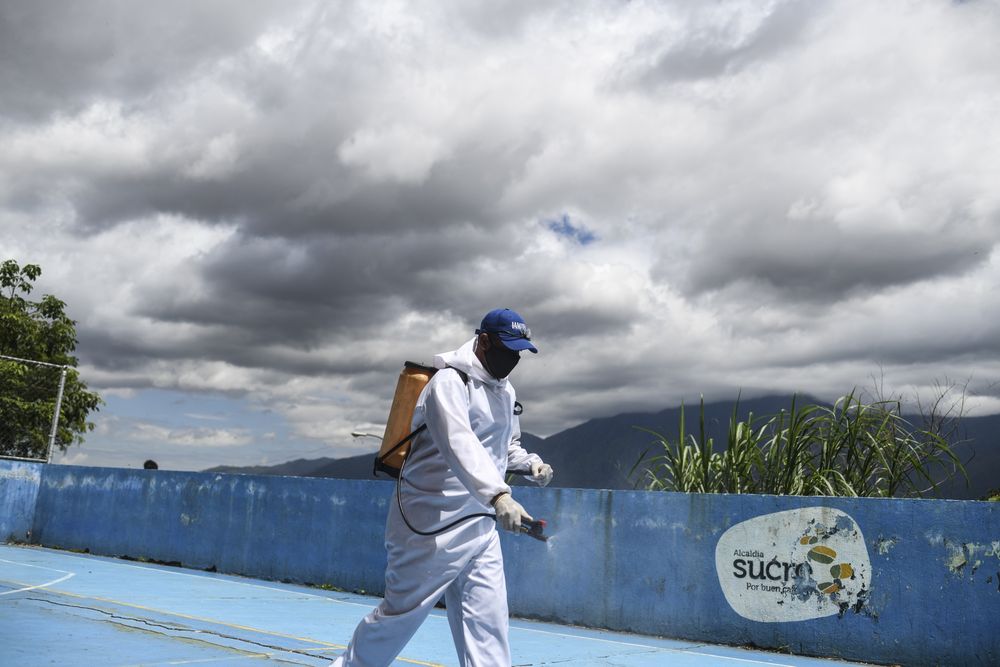RIO DE JANEIRO, BRAZIL – After a year of coexistence with covid-19, the Brazilian mutation has caused a great wave of contagions to reach the Caribbean country, with citizens frightened by their own crisis and the possibility of hospital collapse.
Medical centers are under the most pressure in a country that accumulated 19,491 cases in March, of the 159,149 registered since the beginning of the pandemic, something which, according to health sector unionist Mauro Zambrano, explained, “could have been avoided if there had been investment in health and planning”.

Zambrano, also general coordinator of Monitor Salud, an association promoted by healthcare workers to denounce the conditions in which they work, pointed out, as an example of the shortcomings they encounter on a day-to-day basis, that there is a 50% deficit in masks for staff working on the front line.
As in the rest of the world, Venezuela’s medical centers have had to adapt to the new reality caused by the coronavirus. However, Zambrano is blunt about hospitals’ evolution in the Caribbean country: “There is a shortage of everything, medical supplies, medical equipment, even biosecurity material,” he explains.
408 health workers have died since the beginning of the pandemic, according to the NGO Médicos Unidos de Venezuela, a relevant figure if one considers that 1,589 people have died in total.
Also, the clinical centers are reaching their limits, according to the trade unionist, who cites as an example the University Hospital of Caracas, the largest in the capital, which “has 1,200 beds and should have 120 intensive care beds; today it has 23 and, of these, only fifteen are for covid-19”.
He explains that it is becoming more and more frequent that they cannot attend infected patients, leading to a “dire situation, because it is already happening that patients are dying at home who may need an intensive care bed”.
FOUR CENTERS, NO VACANCIES
This odyssey is well known to Pedro (not his real name), who explains that a 26-year-old relative, an asthmatic, began to “present respiratory failure” after seven days isolated at home.
Under condition of anonymity for fear of reprisals, he comments that he went to the nearest center, the Vargas Hospital in Caracas.
“There, in the emergency room, there is a small hallway where patients with covid are waiting to be seen and a queue outside. Inside, the nurses, from an entrance with little light and leaks in the ceiling, inform you that there is no room and tell you the number of patients in line,” he explains.
After seeing that it was impossible to be attended, he went to three other medical centers without success.
“Until we got a home service, which cost about US$150, where she was treated and stabilized,” she says.
The problem was not born with the arrival of the Brazilian variant of the coronavirus. Still, its ease of transmission brought the country to the edge of an abyss since, as the president of Datanálisis, Luis Vicente León, explains, Venezuela was a country “hypersensitive” to the pandemic due to the structural weakness of its health system.
In León’s opinion, “the situation, from now on, is very complicated, it tends to become even more complicated and, of course, it will generate collapses”.
However, León warns that in the year that has elapsed since the first cases were detected, Venezuela has received support from international cooperation and “from the Government’s allies”, which has allowed the system to be better prepared.
On the one hand, he emphasizes that “the basic infrastructure problems remain unresolved”, but, thanks to this international contribution, “there is a little more attention capacity”, also benefited by a better knowledge of the disease.
However, he considers that, although there may be a hospital collapse, it would be similar to that which occurred in other countries, without reaching the levels seen in Peru or Ecuador.
“I don’t think we are going to see a process equivalent to those experienced in some areas of Ecuador. I tend to think it will be more like the conventional crises in other Latin countries,” he says.
In any case, this will not happen “because Venezuela has a better capacity than Guayaquil” or “particular areas of Ecuador and Peru where things were dramatic”, but because of international support and better knowledge of the disease.

